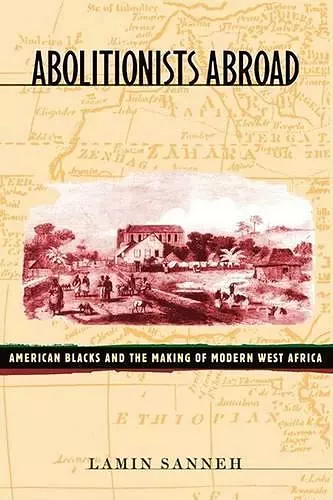Abolitionists Abroad
American Blacks and the Making of Modern West Africa
Format:Paperback
Publisher:Harvard University Press
Published:5th Dec '01
Currently unavailable, and unfortunately no date known when it will be back

Abolitionists Abroad tells the story of the cultural revolution engineered by freed slaves who traversed the Atlantic--again--to help destroy Africa's peculiar institution. Engrossing, inspiring, impeccably researched, Sanneh's book will change the way you think about Africa. -- Henry Louis Gates, Jr.
In 1792, nearly 1,200 freed American slaves crossed the Atlantic and established in Freetown, West Africa, a community dedicated to anti-slavery and opposed to the African chieftain hierarchy that was tied to slavery. Lamin Sanneh’s engrossing book narrates this story.
In 1792, nearly 1,200 freed American slaves crossed the Atlantic and established themselves in Freetown, West Africa, a community dedicated to anti-slavery and opposed to the African chieftain hierarchy that was tied to slavery. Thus began an unprecedented movement with critical long-term effects on the evolution of social, religious, and political institutions in modern Africa.
Lamin Sanneh's engrossing book narrates the story of freed slaves who led efforts to abolish the slave trade by attacking its base operation: the capture and sale of people by African chiefs. Sanneh's protagonists set out to establish in West Africa colonies founded on equal rights and opportunity for personal enterprise, communities that would be havens for ex-slaves and an example to the rest of Africa. Among the most striking of these leaders is the Nigerian Samuel Ajayi Crowther, a recaptured slave who joined a colony in Sierra Leone and subsequently established satellite communities in Nigeria. The ex-slave repatriates brought with them an evangelical Christianity that encouraged individual spirituality--a revolutionary vision in a land where European missionaries had long assumed they could Christianize the whole society by converting chiefs and rulers.
Tracking this potent African American anti-slavery and democratizing movement through the nineteenth century, Lamin Sanneh draws a clear picture of the religious grounding of its conflict with the traditional chieftain authorities. His study recounts a crucial development in the history of West Africa.
In his most recent work, Lamin Sanneh offers a novel perspective on nineteenth-century antislavery movements. Instead of the usual narratives of William Wilberforce in England or William Lloyd Garrison in America, Sanneh tells of the vital role Africans--albeit often Americanized or Anglicized Africans--played in the abolition of slavery both on their own continent and around the globe...Sanneh's narrative poses some of the broadest and most important questions in the history of global colonization and modernization. Should we agree with him that the imposition of Western liberal cultural values and social organization in Africa--when these values were promoted by Africans themselves--was unambiguously a good thing? Should the entire world therefore be made over in the image of the United States with its notion of individual rights? -- Stewart Davenport and Wiebe Boer * Books & Culture *
In this absorbing study, Sannah argues for the historical significance of the settlement in Freetown, West Africa, established by nearly 1,200 freed slaves in 1792 as the foundation for a powerful anti-slavery movement that influenced social policy in both America and Europe. Using journals, letters and other evidence gleaned from public records, he shows that freed slaves and former captives such as Olaudah Equiano, David George, Paul Cuffee and others believed that abolitionist sentiment, together with Christianity, with its theme of God-giving humanity, could become an effective liberating force...This well-documented book offers sharp historical insights on an important but often neglected chapter in the history of American slavery. * Publishers Weekly *
Sanneh argues that modern antislavery in Europe and America emerged from an evangelical Christianity centered on personal salvation that empowered a bottom-up social movement of ex-slaves, ex-captives, and their allies. These downtrodden outcasts created an 'antistructure' in the form of an alternative community that broke old structural traditions as best illustrated by the Sierra Leone colony created by blacks displaced during the American Revolution. There, Sannah argues, a new society based on freedom and human dignity formed a foundation for modern West Africa. -- Thomas J. Davis * Library Journal *
Sanneh focuses on the colonization or 'back to Africa movement' as an outgrowth of the abolitionist-antislavery movement...[He] recounts the experiences of the black abolitionists to illustrate the conflicts and cross currents in the slave trade debate that are not generally discussed...Sanneh's work reflects the conflict of Christian values with domestic politics, which provided the opportunity for black Americans to influence the development of modern West Africa. -- Vernon Ford * Booklist *
Abolitionists Abroad tells the story of the cultural revolution engineered by freed slaves who traversed the Atlantic--again--to help destroy Africa's peculiar institution. Engrossing, inspiring, impeccably researched, Sanneh's book will change the way you think about Africa. -- Henry Louis Gates, Jr.
Lamin Sanneh's book seeks to redirect the study of black abolitionism by accentuating the importance of Black Loyalists' return to Africa after the American Revolution
Sanneh's provocative interpretation broadens the study of abolitionism into an Atlantic perspective and re-centres abolitionism to include the Black Loyalists. -- Graham Russell Hodges * The International History Review *
- Nominated for African Studies Association (ASA) Best Book Prize (formerly known as the Melville J. Herskovits Prize) 2001
- Nominated for Award for Excellence in the Study of Religion 2002
ISBN: 9780674007185
Dimensions: unknown
Weight: 458g
320 pages